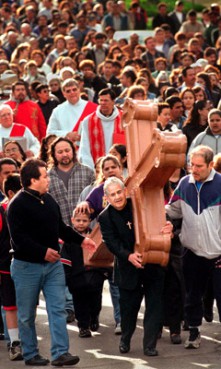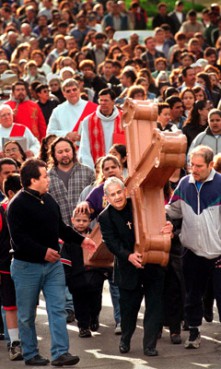
(RNS) Followed by more than 1,500 Good Friday worshippers in 2000, Jessie Rodriguez carries a cross that once stood atop Sacred Heart Church in Aurora, Ill. The scene is part of a “Way of the Cross,” or Via Crucis, procession that re-enacts and commemorates the march of
Jesus to his crucifixion. Religion News Service file photo by Steven Buyansky/The Beacon News.

(RNS) Followed by more than 1,500 Good Friday worshippers in 2000, Jessie Rodriguez carries a cross that once stood atop Sacred Heart Church in Aurora, Ill. The scene is part of a “Way of the Cross,” or Via Crucis, procession that re-enacts and commemorates the march of
Jesus to his crucifixion. Religion News Service file photo by Steven Buyansky/The Beacon News.
(RNS) Vanderbilt University student Katherine Precht knows what skeptical scholars say about the Bible: it’s full of errors, contradictions and a murky historical record.
Still, none of that has shaken her Christian faith.
That’s because Precht embraces a big-picture view of biblical truth. For her, it means the Bible speaks truth on ultimate things, such as Creation and salvation. Where two Gospels give slightly differing accounts of the same event, for example, she’s unfazed.
“Sure, there may be contradictions, (but) God was working through the scribes who put it together,” said Precht, a United Methodist from Montgomery, Ala. “Even though (Christian Scripture) is 2,000 years old, I see it alive and living and breathing every day in friends, in Christians, in the world.”
As Christians prepare to mark Easter and the holiest week of the year, many are mindful of hard-to-ignore critiques that would deem creeds and Scripture at best untrustworthy and at worst, downright false.
Steadfast believers will sing about the wondrous cross even though they’ve heard “Jesus Wars” author Philip Jenkins insist their beliefs are merely the result of ancient politicking. Some trust what the Gospels say about Jesus’ last days, despite the doubts of biblical scholars like Bart Ehrman, whose public questioning has made him a best-selling author.
Christians aren’t necessarily dismissing the research of naysayer scholars. Many just think conclusions based on that research have been way overblown — sometimes by scholars with an anti-faith agenda or a hyperbolic flair.
For these believers, faith isn’t obliterated when minor details reveal an inconsequential discrepancy or human influence in the Bible. Some scholars “get fixated on some of the marginal issues about who was where and when,” said Craig Evans, professor of New Testament at Acadia Divinity College in Nova Scotia.
In the Gospels, “the discrepant witnesses are allowed to stand side by side, and I think that’s a strength in the end, not a weakness. But the naive reader — the person beguiled by the notion that discrepancies somehow cast doubt on the truth of the entire report — might not know that,” Evans said.
Traditional Christian beliefs continue to resonate with large swaths of Americans: 70 percent believe in a personal God, according to the 2008 American Religious Identification Survey (ARIS), and nearly a third believe the Bible is the actual word of God that should be taken literally, according to recent Gallup Polls. Another 47 percent believe the Bible is divinely inspired.
In recent years, some writers have created a cottage industry of research that casts doubt on Christian doctrines. Ehrman, author of “Jesus, Interrupted: Revealing the Hidden Contradictions in the Bible (and Why We Don’t Know About Them),” takes aim especially at fundamentalist beliefs that pivot on the idea that the Bible is a flawless record of events.
“The view on the religious right, about the Bible being some kind of inerrant revelation or an infallible revelation from God … simply isn’t tenable anymore,” said Ehrman, a fundamentalist-turned-agnostic who teaches at the University of North Carolina.
The literal truth of the Bible, Ehrman said, “really can’t survive scholarship.”
Some of Ehrman’s examples involve events remembered during Holy Week. In “Jesus, Interrupted,” he frames the issues as more than simply “small details here and there … Was Jesus in doubt and despair on the way to the cross (Mark) or calm and in control (Luke)? Did Jesus’ death provide an atonement for sin (Mark and Paul) or not (Luke)?”
Critiques aimed at Christian beliefs may be having some impact. The 2008 ARIS survey found that the percentage of Americans claiming no religious affiliation doubled, to 16 percent, since 1990.
Yet by and large, Christians seem to be holding fast to their beliefs and sometimes reconciling them with scholarly challenges.
Frank Stegall Jr., a medical student at the University of Georgia, said he believes that “to be a Christian, you have to believe the Bible is the inspired Word of God and is infallible.” An observant Presbyterian, he admits to facing challenges to that faith.
“These authors (who question Christian foundations) are raising stumbling blocks,” Stegall says. Yet for him, the Bible’s authority doesn’t depend on whether all its accounts of history line up perfectly with one another. Instead, he sees Scripture as authoritative because it’s been changing lives for nearly two millennia.
“The inerrancy of the Bible is evidenced in the fact that it is the most transformative piece of literature that’s ever been written,” Stegall said. “It transforms people’s lives in a way that nothing else can come close to.”
(FIRST OPTIONAL TRIM FOLLOWS)
For some, scholarly challenges actually add to the excitement of a faith journey. At Mount Carmel United Methodist Church in Henderson, N.C., the Rev. Andrew Thompson sometimes probes the origins of texts in Bible study groups. Participants often “express some surprise,” he said, about how Gospel accounts vary.
But in Thompson’s view, “the discrepancies (that scholars highlight) are not so great as to call fundamental truths into question.” Study group members aren’t shaken either, he says.
“Most people (in my church) are not threatened by these findings in the way Bart Ehrman is,” Thompson said. “Their surprise is not followed by dismay. It’s followed by curiosity.”
(SECOND OPTIONAL TRIM FOLLOWS)
For Ehrman’s part, he doesn’t regard all forms of Christian faith as antiquated or untenable. Those who understand the Creation accounts of Genesis as metaphor, for instance, are in his view “moving in the right direction.”
But at this time of year, plenty will proclaim the Resurrection as more than a metaphor for a new beginning — and will make no apologies for that view.
“The Resurrection of Jesus is, in the Gospels and in a variety of sources, portrayed as a real event,” said Evans, the Canadian scholar. “It’s (based on) eyewitness testimony. It’s not some metaphor…. It’s the fire that gave rise to the smoke. It’s the reason that there is Christian faith.”




